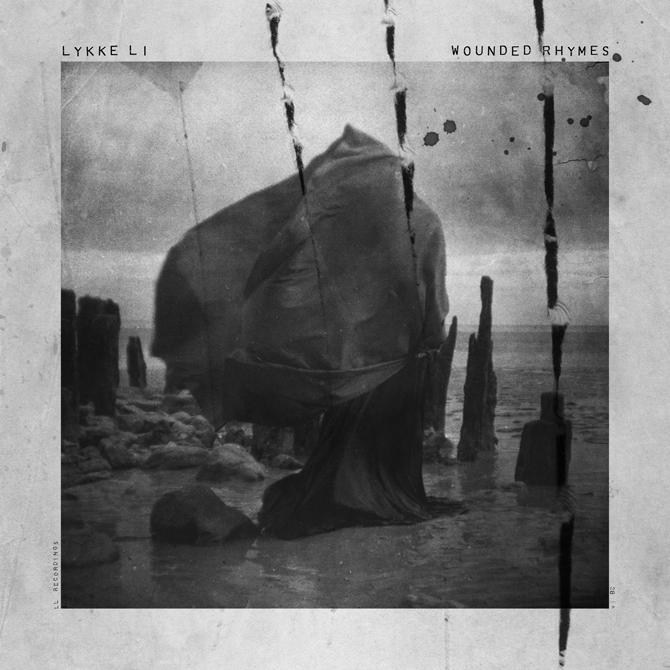It was decided 10 minutes after “Everybody But Me” hit NPR: Lykke Li was the new indie adorable. With Zooey Deschanel settled down with Ben Gibbard of Death Cab, the bruised indie ego is in need of a new crush, and Youth Novels presents her in spades: nervous and bold, Swedish, and with a tendency towards the melancholy, Li was readymade for hipsters unsure of how to pronounce her name. Yet, as anyone who caught one of her shows will tell, the actual girl behind the image is less than willing to play nice. The truth is, despite the general awesomeness of Novels, Li seemed a little unsure of herself, straying between bright originality and playing to expectations. On Wounded Rhymes, it’s no more Ms. Nice Li. These few years have clearly done her good, because this time, it was clearly her way, all the way. For those looking for a sunny, indie-tastic album, well, you’re in for a surprise.
If the title isn’t enough of a hint, this record finds a far less idealistic Li painfully recounting mistakes and desires. The album essentially works as a sequel to her first effort, picking up where she left off. On Novels, Li timidly flirted with love, and then joyously romped about, ultimately to receive an emotional wallop from Mr. Should-Have-Been before it all closed. Well, the girl that sounded so shattered on “Time Flies” has put herself back together. How’d she make out? She didn’t, the girl is gone. In her place is the woman: Lykke Li the femme fatale. She used to sadly scorn boys trying to get in her pants, “without knowing her name,” but now – hey, fuck it – you can “Get Some.”
The album serves as a bit of a soundtrack for anyone who’s managed to retain a romantic outlook past the age where such a thing is likely realistic, and the bitter struggle of rediscovery that follows. It’s a bitch, and Li sees no reason to pretend it’s not. She may not sound as fragile here, but that’s because this is an album about being broken. Whether she likes it or not, Li is clearly a hopeless romantic, and the beauty of this album comes from the contradiction stemming from her very being: simultaneous apathy and desperation. On “Love Out of Lust,” she sings of a relationship founded on little to nothing, but still can’t help but think, “We can do better.”
Still, this album may as well be war torn, and sure as hell takes no prisoners. “Get Some” as the first single was no accident: it presented the Li most radically removed from her debut. Throughout the tracklist, she kicks, screams, and cries bloody murder, but by the end, she just couldn’t rid of her heart. It’s truly a journey: each track builds on the other, furthering Li towards acceptance. Wounded Rhymes is an album of two tragedies: love rejected and love missed. Towards her hypothetical man, Li is flustered and uncertain of herself, but when songs like “I Know Places” come around, she lets us into her little world, and one can’t help but feel the sense of loss that derives from intentions so genuine, cast aside. In other words, if someone you really liked has ever rejected you, regardless of your sex, you’ll feel this one. It all comes down to “Silent My Song.” She may have spent an album trying not to, but Lykke Li cares a lot: a hell of a lot. What she finally seems to have grasped is that you can’t make anyone else feel the same, listeners included. So, instead of a grand, closing ballad addressing her final feelings, we are presented with an idea far more real: a muted cry. No matter what song she sings, he isn’t going to listen. That’s what makes this album special: it’s a dedication to the moments that didn’t happen, that couldn’t, as much as it is to those that did. It’s rare that an artist finds a voice in the unsaid. You could call her loss our gain.


